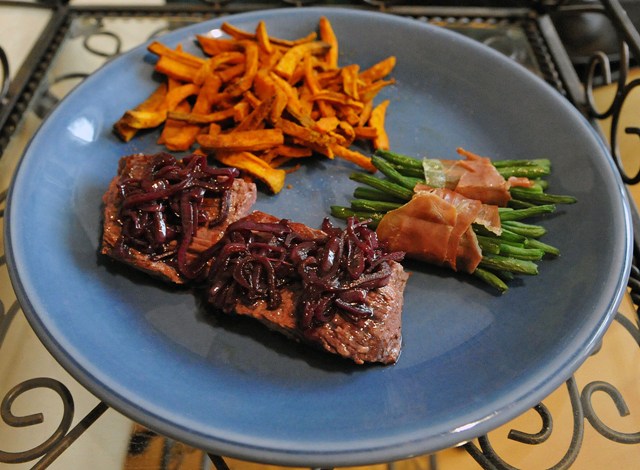I've been trying to stick to eating relatively low carb, low fat foods. (With the occasional pizza and ice cream, of course...both are soooo good in Munich, thanks to a heavy Italian influence).
While I do feel much better eating this way, I do get awfully bored sometimes and am searching for new options.
I was thrilled to discover something new at the store - ostrich filet! You will see it on menus here as strauss, strauß, or straußenfilet. It's not exactly widespread, but not really unusual either. Many a German has travelled to South Africa and enjoyed the cuisine there. In fact, the store periodically has Steinbock (antelope) and biltong (South African jerky).
It surprised me that ostrich filets were cheaper per kg than beef, and they're quite tasty and almost nonfat. All good things, but the big question was, what do I do with it??
Luckily we live in the age of Google, and the ostrich producers wisely realized that not knowing what to do with their product is a big obstacle to selling it. Klein Karoo has a long list of recipes available, ranging from a simple filet to ostrich goulash, ostrich sushi, and ostrich shepherd's pie. For our first foray, we chose the simple steak, with a shallot redwine glaze recipe from The Ostrich Growers' recipe site.

I baked some cumin/chile sweet potato fries and some proscuitto-wrapped baby green beans (blanch beans, let cool, then wrap with proscuitto or bacon and bake in oven). And we had some nice Austrian red wine from our trip to Vienna.
While it looks like steak and tastes similar (minus, the beefy taste), you cannot cook it like a steak. Ostrich has almost no fat, thus will dry out very easily. For the same reason, it absorbs marinades quickly and will take on the taste of the marinade more than will a steak.
The best way to serve ostrich (to be tender) is a bit on the rare side.
How to Cook Ostrich Steaks:
Let the meat warm close to room temperature and baste with olive oil or marinate for 30 minutes in an oil-based marinade (without any salt!!).
Sear filets on both sides in a hot skillet (around 1 minute per side).
Season meat AFTER searing, so that the salt and seasonings do not suck out the moisture.
At this point you can continue to cook in the skillet another 2 minutes per side (to be medium rare). Then wrap in foil to rest before serving.
Or, we wrapped the seared filets in foil and cooked for a few minutes in the oven around 120°C (250°F).
Red Wine Shallot Glaze:
from Ostrich Growers
- 2 Tbsp butter
- 2/3 cup finely sliced shallots
- 1 cup dry red wine
- Salt
Heat skillet over high. Add butter and shallots and stir frequently 2-3 minutes (until shallots are limp)
Add wine and boil until reduced to 3/4 cup, about 5 minutes. Add salt to taste. Add juices from the meat and serve over ostrich filet steaks.